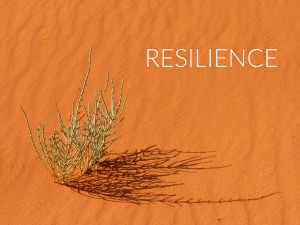
Resilience is such a great word. The word holds so much sparkling promise to me. We use the word resilience in psychology to describe the ability of people to bounce back from adversity. It is a trait common to people who, when knocked down by life, simply spring back with renewed and dedicated intent to overcome hardship and come back even stronger than before. It may be the ultimate key to happiness and well being.
Resilience is marked by such characteristics as optimism, positive attitudes, the ability to regulate and attenuate emotions, and an enduring capability to see failure as an opportunity to learn and grow. Following misfortune, the resilient among us are able change course, marshal their inner strength and soldier on.
Resilience is often missing from people who are either burned out or burning out in their work, relationships or on living. Resilience is a key factor in fostering engagement through purposeful work. Engagement, with the three hallmarks of vigor (energy), dedication (involvement) and absorption (efficacy), is the exact opposite of burnout.
Resilience isn’t something only a few people can have. It is a compilation of thoughts, behaviors and actions. Anyone who is not resilient can become resilient. It is a learned behavior. But like any acquired skill, it must be practiced.
So, how does one attain resilience? What steps can be taken? Here are ten steps which will promote resilience.
- Successive approximations toward your goals. Break large projects into smaller more manageable bits and move through them sequentially. This will lessen the impact of mistakes along the way.
- Be decisive. Indecision is the playground of doubt. Weigh the available options then make a decision. Accept no wiffle waffle in yourself. Project no indecision toward others. You won’t always make the correct decision being decisive or by being indecisive. Being decisive just saves valuable time.
- Avoid catastrophizing. Don’t view problems, mistakes and failures as insurmountable. They never are and I can prove it. If you don’t surmount them, someone else will.
- Maintain a high altitude perspective. Always keep an eye on the big picture to avoid drowning in the minutia.
- Connect with like minds. Nothing fosters perseverance more than hanging out with positive people who persevere.
- Greet change with flexibility and adaptability. Change is inevitable. Change is necessary. It is the only way to get from bad to good and from good to better, even if you have to go in the opposite direction sometimes to get there.
- Capitalize on failure. Failure will teach you what you did wrong or what you need to know if your remain open to learning. Consider this, no one else may know what you may have learned from your failures. That is valuable information.
- Be optimistic. It costs no more in mental energy to think optimistically and you’ll feel a whole lot better versus pessimistic thinking. Plus, you’ll generate more solutions and great ideas with optimistic thinking versus pessimistic thinking.
- Acknowledge your feelings. It’s okay to feel emotional pain from anger, loss or sadness. Feelings are neither good or bad, they just are. Whether good or bad depends on what you do with them. Just realize you don’t have to live with them 24/7 and you don’t have to let them prevent you from reaching your goals. Look forward to feeling better and time will take you there.
- Be whole. Attended to your mental, emotional, physical and spiritual needs. You can not be resilient with a life out of balance.
Practice these steps daily and over time resilience will become your default position for handling problems, stress, adversity and tragedy. Resilience can make the difference between a life well lived, one with passion and purpose, or a life steeped in misery, lost in bitterness and regret.
Are you resilient? Can you bend in the winds of change without breaking? Can you bounce back from adversity and tragedy?
There are many things a person can do to develop or strengthen resilience. If you know you lack resilience, are feeling perpetually defeated or stuck over some past event, please press the CONTACT button below and let’s discuss your current situation with a free 30 minute coaching call.
Dr. G, as you know DSI recently displaced a large number of dedicated representatives, being one of those, your message of resilience is spot on. Thanks!
Thank you Mike! Pharmaceutical representatives as a group have taken it on the chin in the past few years. Compared to 15 or 20 years ago, this portion of the industry is unrecognizable. The current work environment for parma representatives solidly embraces several of the six job-employee mismatches which lead to job related burnout. Only the resilient will survive and thrive. I appreciate your comments.